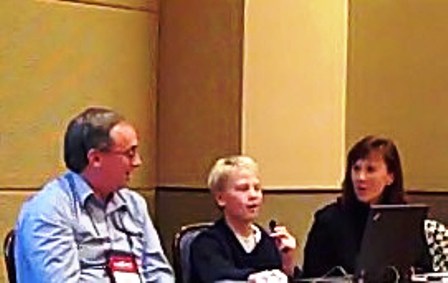When a child looks normal, but does not learn well, we sometimes make the assumption that the child is lazy or not focused enough on their studies in school. Parents deal with this common and almost always frustrating scenario every day when they have a child with learning disabilities (LD) or special needs.
Kathryn Roset, an Arkansas attorney and parent of five, faced this frustration for years since her son Dane, now eleven, was a toddler. “When we see a child with physical issues, we understand their learning challenges instantly and hopefully prescribe strategies and technology accommodations that will help,” said Mrs. Roset. “But learning disabilities can be hidden; it becomes more difficult to accept, prescribe and deliver learning experiences in effective ways.”
Dane, a sinewy child with pretty white blond hair and the biggest of smiles, faces frustration every time he picks up a pencil or a book. Dane participates in the Arkansas Virtual Academy (ARVA) which is an online state charter school. ARVA provides students with the K12 curriculum, supplies, a grade level teacher and support services. Dane receives occupational, physical, and speech/language therapies, along with mental health services to assist him. In return, Mrs. Roset functions as his primary learning coach and is required to make sure he fulfills all district and state requirements such as testing and attendance.

From kindergarten to 3rd grade, Dane struggled with speech and comprehension. “He put a tremendous amount of effort into learning, but didn’t receive any results for his hard work,” said his mom. “He would just shut down and cry.” Dane’s family and teachers knew he was not learning like other children, but could not easily find a doctor or specialist to diagnose his disability and prescribe alternatives. “This ambiguity led everyone to be confused as to what might help him learn,” adds Mrs. Roset. Dane was not found eligible for special education services and did not have a formal IEP (Individual Education Plan).
“No one could tell if he got the meaning of what was said or read to him,” she continued. “I’d try to describe his thinking process as a ‘pin-ball machine’ to teachers and doctors who tried to help us. Information just bounced around in his brain, making noise. Some content stuck and lots got lost in his central auditory system. I did not know that he could learn and process information until we took him on a Florida vacation and out of the blue he wrote ‘DAD’ in the sand. He looked up and said, ‘Mom, look what I wrote!’ That was at the end of first grade and I was determined to find learning resources and educational solutions for my son.”
Mrs. Roset believes most parents are at a disadvantage when it comes to developing an IEP for their child. “I didn’t understand the technicalities of the form, so I relied on a special education expert to help me. That’s when we met Mr. Ayres.”
Dane’s school agreed to pay for a tutor and the family met Bryan Ayres, Director of the Technology

and Curriculum Access Center for Arkansas Easter Seals in Little Rock. Mr. Ayres educated them about technology accommodations like reading software and educational resources. In 2009, he assisted Dane’s family in signing up for an individual Bookshare membership through the Arkansas Virtual Academy and downloaded his first digital book onto reading software called Read & Write, Gold, by TextHelp. This text-to-speech software reads DAISY (Digital Accessible Information SYstem) file formats. The program highlights words on the computer screen so Dane can hear and see the text read aloud. This ‘multi-modal’ reading experience is beneficial for children with LD and other print disabilities.
Dane’s mother and Mr. Ayres noticed a change. “Dane began to comprehend more of a story and even talk about it with his brothers,” said Mrs. Roset. “Now he asks for more digital stories and wants to know what books are in Bookshare’s library.”
“Prior to the use of assistive technology and Bookshare, Dane would not have been able to read one paragraph,” said Mr. Ayres. “He frequently lost his place and became frustrated and anxious. Now, in 4th and 5th grades, he’s read several novels and can research, plan and write stories and reports with many paragraphs.”
Dane doesn’t rely as much on his mom now to read to him. He can sit by himself and enjoy a book. He is making progress, but has a ways to go. His learning disability has cost him years of undue hardship and frustration and has required research and networking with special education and medical experts to find strategies and technologies to address his learning disabilities. Through his mother’s undeniable strength and unfailing love, lots of help from teachers, tutors, organizations like Easter Seals and Bookshare, and accommodations on his IEP, there is lots of hope for Dane.
“When you have a child with LD, the road is hard and discouraging,” said Mrs. Roset. “Never give up! Through assistive technology and Bookshare, we have seen small victories for our son. Dane now comprehends whole stories and is less frustrated. This year, he gave two presentations about his use of technologies and Bookshare at the ATIA (Assistive Technology Industry Association) conference. Now he can demonstrate his true knowledge. We’ve seen a little beam of light shine through his learning barriers that we felt were almost impossible to overcome. That feels pretty good at this point in time.”
This article was originally published in the Special Education Advisor.

It’s interesting (and sad!) that when his mother made initial inquiries, Dane was found ineligible for special education. In my experience (one son in special education) this is because school staff are trained more to find reasons not to help a child than to trouble-shoot, problem-solve, analyze, and craft a program that concretely benefits the child.
We are have been experiencing these same issues with our daughter who is now a freshman in high school. In 2006 (2nd grade) she was tested by the school district who found no reason for her to have an IEP just a 504 with a DX of ADHD. Problem is all along we kept pressing the issues of her constant struggle with reading, writing and school work in general. Our daughter has always worked triple the amount than the average student and has learned how to compensate for her areas of weakness. She learned how to pass. Here we are in high school in our biggest battle yet because the struggles have increased slightly out of her reach. We had her privately tested and it was confirmed she indeed has a learning disability with reading, writing and central auditory processing. Our daughter is stressed to the max and the school district still does not want to work with us to provide her the supports she does need and require. We are now being faced with bringing an attorney into assist. I am beside myself and frustrated with the entire system. These are people that we trusted to be professionals. It’s a disgrace that the system works this way at the expense of our children.